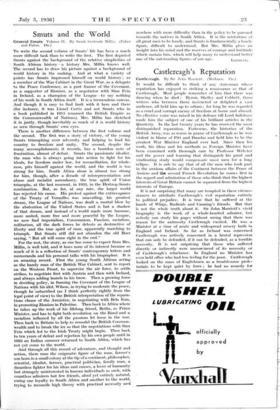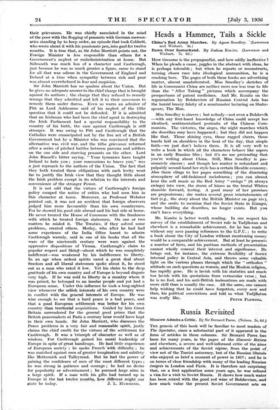Castlereagh's Reputation
Castlereagh. By Sir John Marriott. (Methuen. 15s.) Iv would be difficult to think of any statesman whose reputation has enjoyed so striking a renaissance as that of Castlereagh. Most people remember of him that there was dancing when he died ; Byron, Shelley and Cobbett, three writers who between them instructed or delighted a vast audience, all held him up to odium ; for long he was regarded as a cruel and corrupt enemy of freedom at home and abroad. No effective voice was raised in his defence till Lord Salisbury made him the subject of one of his brilliant articles in the Quarterly. In the last twenty years he has received the most distinguished reparation. Fortescue, the historian of the British Army,Ivas as warm in praise of Castlereagh as he was violent in blame of Pitt and Dundas and held him to be the greatest War Minister England ever had. Since then his work, his ideas and his methods as Foreign Minister have been examined with thorough care by Professor Webster and the power and learning that distinguish his great and vindicating study would compensate most men for a long eclipse. It is safe to say that of all the men who took part in the anxious affairs of the Continent between the Peace of Amiens and the second French Revolution he comes first in the regard and admiration of those who think that the highest interests of Great Britain cannot be separated from the highest interests of Europe.
It is not surprising that many are tempted in these circum- stances to attribute Castlereagh's evil reputation entirely to political prejudice. It is true that he suffered at the hands of Whigs, Radicals and Canning's friends. But that is not the whole truth about it. Sir John Marriott's vivid biography is the work of a whole-hearted admirer, but nobody can study his pages without seeing that there was reason for the animosity Castlereagh excited. He was a Minister at a time of acute and widespread misery both in England and Ireland. So far as Ireland was concerned Castlereagh was actively concerned in a brutal repression that can only be defended, if it can be defended, as a terrible necessity. It is not surprising that those who suffered directly or indirectly were unconvinced of its necessity or of Castlereagh's reluctance. In England no Minister has ever held office who had less feeling for the poor. Castlereagh looked on the mass of Englishmen as a troublesome prole- tariate to be kept quiet. by force ; he had no remedy for
their grievances. He was chiefly associated in the mind of the poor with the flogging of peasants with German mercen- aries standing by to keep order, an episode that took Cobbett, who wrote about it with his passionate pen, into gaol for twelve months. It is true that,as Sir John Marriott points out, the Foreign Minister is less responsible than others for a Government's neglect or maladministration at home. But Sidmouth was much less of a character and Castlereagh, just because he was so much greater a figure, came to stand for all that was odious in the Government of England and Ireland at a time when sympathy between rich and poor was almost overwhelmed in fear and suspicion. .
Sir John Marriott has no qualms about the Union. But he gives no adequate answer to the chief charge that is brought
against its authors ; the charge that they refused- to remedy
wrongs that they admitted and left it to their successors to remedy them under duress. Even so warm an admirer of Pitt as Lord Ashbourne said of his neglect of the tithe question that it could not be defended: If it is admitted that an Irishman who had been the chief agent in destroying the Irish Parliament had a special responsibility to the country• of his birth, the case against Castlereagh is still stronger. It was owing to Pitt and Castlereagh that the Catholics were emancipated not by the free act of a British Government but by a Minister who was convinced that the alternative was civil war, and the tithe grievance reformed after a series of pitched battles between parsons and soldiers on the one side and starving peasants on the other. Lord John Russell's bitter saying, " Your tyrannies have taught Ireland to hate you ; your concessions to brave you," was a just reproach to the authors of the Union. The fact that they both treated these obligations with such levity went far to justify the Irish view that they thought little about the Irish problem except in its relation to the interests and convenience of the stronger Power.
It is not odd that the virtues of Castlereagh's foreign policy escaped the notice of critics who had seen him in this character at home. Moreover, as Professor Webster pointed out, it was not an accident that foreign observers judged him more favourably than his own countrymen. For he showed his good side abroad and his bad side at home. He never treated the House of Commons with the frankness with which he treated foreign statesmen. On one or two matters he misled it. The Treaties, if they solved some problems, created others. Morley, who after he had had some experience of the India Office learnt to admire Castlereagh warmly, said in one of his books that all the wars of the nineteenth century were wars against the oppressive dispositions of Vienna. Castlereagh's claim to popular respect and liking—about which he was completely indifferent—was weakened by his indifference to liberty. In an age when ardent spirits cared a great deal about freedom and all liberal statesmen spoke about it, he stood out as a man who rated it low. Yet his claim to the deep gratitude of his own country and of Europe is beyond dispute very high. If he was cold to liberty in a country where it was prized, he belonged to an insular people and yet had a European sense. Under this influence he took a long-sighted view whenever the selfish interests of his own country were in conflict with the general interests of Europe. He was wjse enough to see that a hard peace is a bad peace, and that a good European settlement .was better for his own country than territorial acquisitions. Guided by him Great Britain surrendered for the general good prizes that the British peacemakers at Paris a century later would have kept in their own hands. Sir John Marriott, who discusses the Peace problems in a very fair and reasonable spirit, justly claims the chief credit for the virtues of the settlement for Castlereagh. It was a 'triumph of - character as well as of wisdom. For. Castlereagh gained his moral leadership of Europe in spite of great handicaps. He had little experience of European society ; he spoke French' with difficulty ; he was matched against men of greater imagination and subtlety like Metternich and Talleyrand. But he had the power of gaining the confidence of men of the most different types ; he was strong in patience and courage ; he had no desire for popularity or advertisement ; he pursued large aims in a large spirit. If a man with his gifts had turned up in Europe in the last twelve months, how different might our















































 Previous page
Previous page